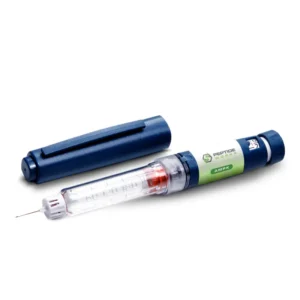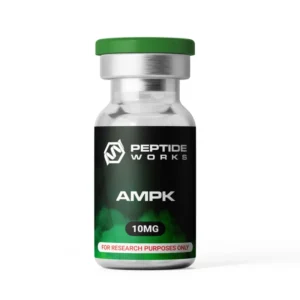PROMO!
First order? Get 10% OFF with this code: 1storder
PROMO!
First order? Get 10% OFF with this code: 1storder
Our Product Categories



AMPK, which stands for AMP-activated protein kinase, plays an important role as an energy sensor in our cells, helping to keep energy levels in check. When our energy dips, AMPK gets activated, typically signaled by an increase in the ratios of AMP to ATP or ADP to ATP.
Once it kicks into gear, AMPK helps restore our energy balance by encouraging processes that produce ATP. For example, processes like taking up glucose and breaking down fatty acids. It also slows down energy-intensive activities, such as making lipids and proteins.
Moreover, AMPK supports the production of new mitochondria and promotes autophagy, which helps our cells be more energy-efficient over time. It’s regulated by kinases such as LKB1 and CAMKK2, making it vital for our cells to cope with metabolic stress and adapt to changing energy demands.

 Buy AMPK Peptide Vials available in 2mg or 10mg sizes. Complete kits are also available, including syringes and bacteriostatic water for added convenience.
Buy AMPK Peptide Vials available in 2mg or 10mg sizes. Complete kits are also available, including syringes and bacteriostatic water for added convenience.AMPK, which stands for AMP-activated protein kinase, plays an important role as an energy sensor in our cells, helping to keep energy levels in check. When our energy dips, AMPK gets activated, typically signaled by an increase in the ratios of AMP to ATP or ADP to ATP.
Once it kicks into gear, AMPK helps restore our energy balance by encouraging processes that produce ATP. For example, processes like taking up glucose and breaking down fatty acids. It also slows down energy-intensive activities, such as making lipids and proteins.
Moreover, AMPK supports the production of new mitochondria and promotes autophagy, which helps our cells be more energy-efficient over time. It’s regulated by kinases such as LKB1 and CAMKK2, making it vital for our cells to cope with metabolic stress and adapt to changing energy demands.
Regulates Energy: Studies reveal that AMPK peptide plays a key role in regulating metabolism by restoring energy balance during times of metabolic stress, both within cells and across the body. It increases energy production (ATP generation) while reducing processes that drain energy.
New research shows that AMPK is regulated in more complex ways, including its location within cells and unique activation methods. Excitingly, scientists have also mapped AMPK’s structure in detail, which is helping to develop better treatments for conditions like diabetes, obesity, and cancer [1].
Improves Metabolic Health: Made up of α, β, and γ subunits, this peptide helps improve metabolic health by boosting glucose uptake and fatty acid breakdown. The specific roles of isoforms, such as α1/α2 activity and β1/β2 regulation, show its broad influence on energy signaling and disease. These findings emphasize the potential of AMPK as a treatment option for metabolic disorders like obesity, insulin resistance, and type 2 diabetes [2].
Intestinal Health: The peptide plays a crucial role in maintaining intestinal health. Studies have shown that it helps regulate cell growth, inflammation, autophagy, barrier integrity, and smooth muscle function. Its role in cancer is particularly complex, as it can act both as a tumor suppressor and a promoter, while also impacting inflammation and gut barrier function. As a result, AMPK is being explored as a potential therapeutic target for intestinal disorders. However, further research is needed to understand its mechanisms and unlock its therapeutic potential fully [3].
Weight Management: AMPK plays a vital role in regulating body fat metabolism, specifically targeting harmful fat types like abdominal and belly fat. By activating AMPK in white adipose tissue (WAT), it reduces unnecessary fat storage while encouraging the formation of energy-burning beige fat [4]. Additionally, AMPK stimulates fat breakdown in brown adipose tissue, making it a promising tool for therapies focused on reducing abdominal fat and effectively managing obesity [5].
Cardiovascular Benefits: AMPK is vital for heart health. Research has shown it reduces atherosclerosis, improves blood flow, and protects heart cells during low oxygen (ischemia). Studies also suggest it may reduce scarring after heart attacks, prevent unhealthy heart growth, and combat diabetic heart disease by improving energy use and reducing oxidative stress [6].
The peptide helps control inflammation, supports cell recycling (autophagy), and regulates nitric oxide for healthy blood vessels. Mutations in the AMPK γ2 subunit are associated with irregular heart rhythms, underscoring its crucial role in maintaining heart function [7].
Neuroprotective Effects: It plays an important role in protecting the brain by regulating energy balance, cell survival, and brain metabolism. Activating AMPK helps maintain neuronal energy levels and supports astrocytic glucose metabolism. However, its dysregulation has been linked to neurodegenerative diseases like Alzheimer’s and Parkinson’s [8].
Interestingly, in cases like ischemic stroke, AMPK inhibition can actually be protective. For example, nicotine has been shown to reduce brain injury by suppressing AMPK. These findings suggest that AMPK could be a valuable target for treating neurological disorders [9].
Reduces Inflammation: It plays an important role in managing inflammation by balancing energy levels and blocking harmful pathways. It reduces inflammatory markers like IL-1β and iNOS by inhibiting transcription factors such as NF-κB and STAT3 [10].
Its activation also helps lower oxidative stress (ROS) and prevents mitochondrial damage, which can ease inflammatory pain in affected tissues. These findings suggest that AMPK could be a valuable target for treating inflammation, metabolic diseases, and inflammatory pain [11].
[1] D Garcia and R J Shaw (2017). AMPK: mechanisms of cellular energy sensing and restoration of metabolic balance – Molecular Cell, 15 June 2017, Volume 66 (Issue 6), Pages 789-800.
[2] W J. Smiles, A J. Ovens, J S. Oakhill, and B Kofler (2024). The metabolic sensor AMPK: Twelve enzymes in one – Molecular Metabolism
Volume 90, December 2024, Page 102042.
[3] C Yibcharoenporn, C Muanprasat, A Moonwiriyakit, S Satitsri, et al (2025). AMPK in Intestinal Health and Disease: A Multifaceted Therapeutic Target for Metabolic and Inflammatory Disorders – Drug Design, Development & Therapy, 2025 Apr 21, Volume 19, Pages 3029-3058.
[4] Q Wang, J Sun, M Liu, Y Zhou, et al (2021). The New Role of AMP-Activated Protein Kinase in Regulating Fat Metabolism and Energy Expenditure in Adipose Tissue – Biomolecules, 2021 Nov 24, Volume 11 (Issue 12), Page 1757.
[5] O Göransson, F Kopietz, and M H. Rider (2023). Metabolic control by AMPK in white adipose tissue – Trends in Endocrinology & Metabolism, Volume 34, Issue 11, November 2023, Pages 704-717.
[6] D Nagata and Y Hirata (2010). The role of AMP-activated protein kinase in the cardiovascular system – Hypertension Research, 2010 Jan, Volume 33 (Issue 1), Pages 22-8.
[7] R Heidary Moghaddam, Z Samimi, S Asgary, P Mohammadi, et al (2022). Natural AMPK Activators in Cardiovascular Disease Prevention – Frontiers Pharmacology, 2022 Jan 3, Volume 12, Page 738420.
[8] R Muraleedharan and B Dasgupta (2022). AMPK in the brain: its roles in glucose and neural metabolism – FEBS Journal, 2022 Apr, Volume 289 (Issue 8), Pages 2247-2262.
[9] A Ouro, A Rodríguez-Díaz, T López-González, D Romaus-Sanjurjo, et al (2025). Neuroprotective effect of small extracellular vesicle-mediated targeting of AMPKα2 in cerebral ischemia – Metabolism, Volume 167, June 2025, Page 156160.
[10] Y Xu, L Bai, X Yang, J Huang, et al (2024). Recent advances in anti-inflammation via AMPK activation – Heliyon, Volume 10, Issue 13, 15 July 2024, Page e33670.
[11] H Xiang, Y Lan, L Hu, R Qin, et al (2025). AMPK activation mitigates inflammatory pain by modulating STAT3 phosphorylation in inflamed tissue macrophages of adult male mice – Molecular Pain, 2025 Jan-Dec, Volume 21: 17448069251321339.
The answers to the most frequently asked questions about AMPK.

Buy AMPK Peptide Nasal Spray from Peptide Works. The spray is available in 15ml and 30ml glass spray bottles.
It is legal to buy AMPK for research only, however, it has not yet been approved for human consumption by the United States Food and Drug Administration (FDA).
AMPK supplements usually include natural compounds like berberine or resveratrol, to help activate AMPK enzyme indirectly. On the other hand, the peptide is a lab-engineered compound specifically designed to directly activate the AMPK pathway, primarily for research purposes.
AMPK activators boost energy balance in the body by increasing energy production and reducing usage. They may improve insulin sensitivity, mitochondrial function, and reduce inflammation. Regular exercise, specific foods, or medications like metformin can naturally activate AMPK, supporting metabolic health and overall well-being.
It has been shown that activation of AMPK helps with fat metabolism and energy balance, which in turn can be supportive of weight loss. But AMPK peptide is still experimental; its efficacy in humans has yet to be demonstrated.
The AMPK peptide is still experimental, and its long-term effects are unknown due to limited clinical research. Some studies have reported the following risks: low blood sugar, fatigue, digestive issues, and unintended weight loss.
Research suggests AMPK activation may support:
These findings are based on preclinical and experimental studies.

This blog explores the benefits of AMPK activation for diabetes management. It highlights how AMPK acts as a cellular energy sensor, improving insulin sensitivity, glucose uptake, and fatty acid oxidation. The article delves into mechanisms like GLUT4 transporter activation, energy balance, and metabolic checkpoints, showcasing AMPK's potential in stabilizing blood sugar and advancing diabetes research.

This blog explores how AMPK improves heart health by acting as a cellular energy sensor. It enhances glucose uptake, fatty acid oxidation, and energy balance in cardiac cells, protecting the heart under stress. The article highlights AMPK's role in preventing oxidative damage, supporting protein synthesis, and promoting mitochondrial function for stronger heart performance.

This blog explores how AICAR activates AMPK pathways to preserve muscle, enhance energy regulation, and support glucose uptake in research settings. It explains key mechanisms like GLUT4 transport, facilitated diffusion and adenosine kinase activity, while highlighting AICAR’s role as a research-only compound studied for cellular energy, metabolism, and muscle protection.
Excellent Customer Support
Value For Money
99% Pure Guaranteed
World Wide Shipping
ALL CONTENT AND PRODUCT INFORMATION AVAILABLE ON THIS WEBSITE IS FOR EDUCATIONAL PURPOSES ONLY.
DISCLAIMER: These products are intended solely as a research chemical only. This classification allows for their use only for research development and laboratory studies. The information available on our Peptide Works website: https://peptide-works.com/ is provided for educational purposes only. These products are not for human or animal use or consumption in any manner. Handling of these products should be limited to suitably qualified professionals. They are not to be classified as a drug, food, cosmetic, or medicinal product and must not be mislabelled or used as such.